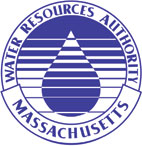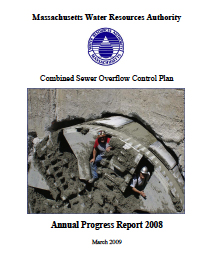JOINT PUBLIC NOTICE
 |
 |
 |
Ria Convery, Communications Director
Massachusetts Water Resources Authority
(617) 788-1105 or ria.convery@mwra.state.ma.us
Owen O’Riordan, Assistant Commissioner of Engineering
City of Cambridge
(617) 349-4845 or ooriordan@cambridgema.gov
Charles E. O’Brien, P.E., Director of Engineering
City of Somerville
(617) 625-6600 ext. 5410 or cobrien@ci.somerville.ma.us
JOINT PUBLIC NOTICE
Alewife Brook Combined Sewer Overflows Progress Update
|
This notice, required by Massachusetts Department of Environmental Protection (DEP), is an annual update on the progress of Combined Sewer Overflow (CSO) control measures undertaken to improve the water quality of Alewife Brook.
You are also receiving this notice if your property lies in the extended floodplain of Alewife Brook.
The water quality of Alewife Brook is often impaired due to bacteria and other pollutants from a number of sources, including cross connections between sanitary sewers and storm drains, urban stormwater runoff and CSOs. During both wet and dry weather, Alewife Brook generally fails to meet state bacteria standards for fishing and swimming.
Portions of Cambridge and Somerville are served by combined stormwater and sanitary sewer systems common in older cities. There are now eight CSO outfalls along Alewife Brook that release untreated discharges during moderate and heavy rainfall. These discharges relieve the sewer system, preventing sewage backups into homes, businesses and streets.
As part of the Boston Harbor Case (D. Mass. C.A. No. 85-0489-RGS), the Massachusetts Water Resources Authority (MWRA) is required to undertake certain corrective actions to reduce or eliminate CSO discharges along Boston Harbor, the Mystic, Charles and Neponset Rivers and Alewife Brook. MWRA, in conjunction with the Cities of Cambridge and Somerville, is currently in the process of designing and constructing several CSO projects that, when completed, will significantly reduce CSO discharges to the Alewife Brook.
Work already completed by the MWRA, Cambridge and Somerville has noticeably reduced the number of CSO events and the total volume discharged to the brook. MWRA estimates that average annual CSO discharge to Alewife Brook has been reduced by 34% since 1987, when after MWRA accepted responsibility for developing and implementing a long-term control plan. MWRA and Somerville closed four CSO outfalls several years ago as part of these CSO control efforts.
The next phase of CSO control work includes a stormwater outfall and treatment wetland associated with sewer separation work in the neighborhood east of Fresh Pond Reservation in Cambridge. Sewer separation primarily involves the construction of a separate storm drain system and removal of storm water flows from the wastewater collection system. Sewer separation in Cambridge is expected to further reduce CSO discharges significantly and allow Cambridge to close a major CSO outfall.
Construction of this project was delayed pending the outcome of an April 2005 appeal of a DEP issued Superseding Order of Conditions under the Wetlands Protection Act by a group of residents (the “Plaintiffs”). Following a proceeding before the Division of Administrative Law Appeals (DALA), DEP issued a Final Decision on June 1, 2007, upholding the Superseding Order of Conditions, and on October 16, 2007, DEP denied the Plaintiffs’ motion for reconsideration. Due to the appeals, all projects in the Alewife Brook CSO control plan were delayed at least 27 months.
Although legal proceedings are still ongoing, Cambridge is now able to proceed with implementation of the Alewife CSO projects. In October 2008, the City of Cambridge resumed design for the stormwater outfall and treatment wetland and commenced design for two of the other projects, which include sewer separation, sewer system hydraulic relief, and CSO floatables controls. Cambridge plans to commence construction of these three projects in late 2009 and early 2010. Cambridge plans to commence design of a fourth project, involving sewer separation in the area east of Fresh Pond Reservation, in the summer of 2009. MWRA plans to commence design of the fifth and last Alewife project, involving improvements related to its CSO outfall to Alewife Brook, in 2011.
Construction of all five projects is scheduled to be completed in 2015. Together, the projects are predicted to reduce average annual CSO volume to Alewife Brook by 85% and bring CSO discharges into compliance with water quality standards 98% of the time on average.
For more information on CSOs and the CSO control program, contact MWRA at (617) 660-7971 or visit MWRA’s website at www.mwra.com, or visit the Cities of Cambridge and Somerville websites at www.cambrigema.gov/~TheWorks and www.ci.somerville.ma.us.
It is important to understand that floodwaters in all cases can present health risks, and proper precautions are necessary to minimize these risks during flooding events. Public health officials recommend avoiding contact with the brook during rainstorms and for 48 hours afterwards, as there may be increased health risks due to bacteria or other pollutants. DEP has developed guidance for homeowners for responding to flooding or sewer backups, which can be found at http://www.mass.gov/dep/water/laws/flooding.htm.
Available on-line at: www.mwra.com and www.cambridgema.gov/~TheWorks.
###
